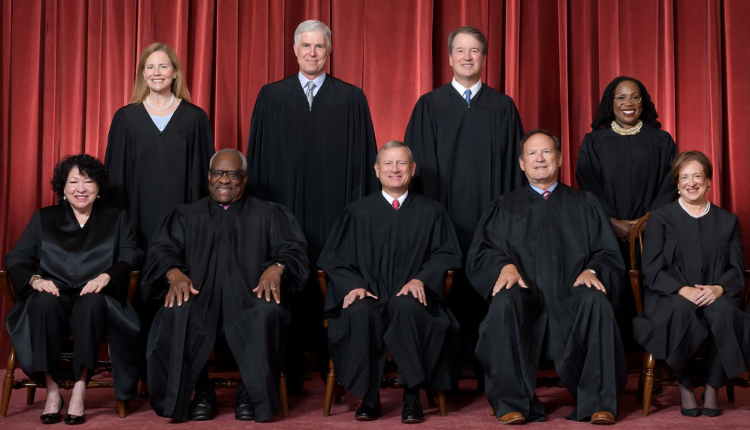One justice was 'especially vocal' in opposition to enforcement mechanism for SCOTUS ethics code, report says

The U.S. Supreme Court’s three liberal justices supported an enforcement mechanism for the high court’s new ethics code, “but their argument never had a chance,” the New York Times reports. (Photo by Fred Schilling via the Supreme Court website)
When the U.S. Supreme released its new ethics code in November 2023, critics complained that it relied on an “honor system,” rather than an enforcement mechanism.
The high court’s three liberal justices—Justice Sonia Sotomayor, Justice Elena Kagan and Justice Ketanji Brown Jackson—supported an enforcement mechanism, “but their argument never had a chance,” the New York Times reports. Its article is based on interviews with anonymous sources inside and outside the court.
Justice Neil Gorsuch feared that an enforcement mechanism could undermine the Supreme Court and “was especially vocal” in his opposition to it, the article reports. He wrote a memo “raising questions and cautions” that was more than 10 pages in length, the article says.
Two other justices—Justice Clarence Thomas and Justice Samuel Alito—“wrote off the court’s critics as politically motivated and unappeasable” in private exchanges, the article says.
Chief Justice John Roberts had for years resisted subjecting the justices to the same ethics rules that apply to other federal judges. But as news reports focused on Thomas’ acceptance of luxury hospitality from wealthy benefactors, Roberts circulated a draft ethics code among the justices that had been prepared by a staff member.
During the justices’ discussion at summer’s end in 2023, they emphasized confidentiality. Rather than relying on their standard email list, they instead passed “paper documents in envelopes to each chambers,” the New York Times says. Despite the lack of an enforcement mechanism, all nine justices signed a revised version of the ethics code.
Federal judges outside the Supreme Court are subject to a binding ethics code. A committee can offer advice, and ethics complaints go before chief circuit judges who can order an investigation and issue sanctions, such as a censure or a reprimand.
Supreme Court justices can get nonbinding advice from a legal office. Their new ethics code includes “no firm restrictions on gifts, travel or real estate deals,” the New York Times reports. Regarding gifts, the code says justices should comply with existing gift guidelines in separate federal rules, which, in their latest version, don’t require disclosure of personal hospitality outside transportation that substitutes for commercial transportation.
The justices also “gave themselves a broad carve-out for book deals and sales, one of the few ways they can make substantial outside income,” the New York Times says. And the justices allowed themselves to rely on chambers staff and resources for activities permitted by the code, which could have been a nod to Sotomayor’s use of court staff for events related to her books.
The policy of recusals is “far looser than that for the lower-court judges,” the New York Times says. The justices decide on recusals themselves and don’t have to explain their reasoning. In private conversations, several justices pointed to an obligation to hear cases because there is no replacement when there is a recusal.
“In an apparent attempt to make a higher level of scrutiny palatable to their colleagues,” the New York Times says, Kagan suggested a “safe harbor” system in which justices could consult a small group of veteran federal judges about ethics issues. Then if justices were criticized, they could reveal that they had obtained clearance.
“That modest proposal went nowhere,” the New York Times says.
The Daily Beast and the Volokh Conspiracy are among the publications that noted the New York Times article.
See also:
Supreme Court justices should follow binding code of ethics, ABA House says



